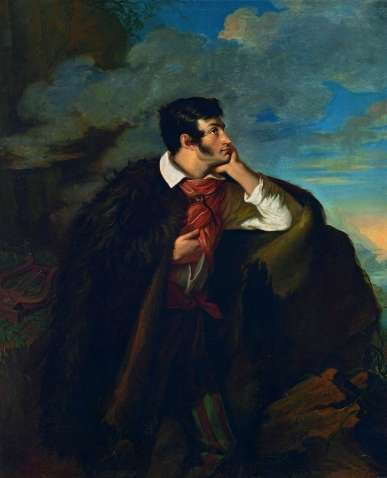
(Walenty Wańkowicz’s Portrait of Adam Mickiewicz, 1827–1828)
The story of modern Polish literature is, to a large extent, a story of exile. In 1795, the Polish-Lithuanian Commonwealth — once the largest nation in Europe — was partitioned for the third and final time by Russia, Prussia, and Austria. For the next 123 years, Poland would exist only in the hearts and minds of the Poles. Of course, it also continued to live on the page, in lines of verse, and no lines gave it as vibrant a life as those of Adam Mickiewicz, Poland’s romantic bard, who was born three years after the Third Partition and died in Constantinople in 1855.
The two poems below are drawn from different periods of his long exile. “The Pilgrim” is part of his romantic cycle of Crimean Sonnets, published in 1826. It is a young man’s poem, in which the speaker is wonderfully alive to the exotic landscape that surrounds him, even as he longs for another one. The elegant translation below, from 1938, belongs to Dorothea Prall Radin (1889-1948), a student and frequent collaborator of George Rapall Noyes. The second poem, which was written in 1839 or 1840 in Lausanne and never published in Mickiewicz’s lifetime, appears here in my translation. At that late date, having seen so many foreign landscapes, the poet is dead to his surroundings. It’s also worth noting that the landscape for which Mickiewicz longs in both poems is Lithuanian. He was born in Navahrudak, in what is now Belarus but was, at various times in the past, Lithuania, the Polish-Lithuanian Commonwealth, the Russian Empire, and the Soviet Union. Mickiewicz’s native terrain is a palimpsest of shifting borders and vanished nations. You can learn a great deal more about all of this from Roman Koropeckyj’s superb biography, Adam Mickiewicz: The Life of a Romantic.
The Pilgrim
A rich and lovely country wide unrolled,
A fair face by me, skies where white clouds sail:
Why does my heart forever still bewail
Far distant lands, more distant days of old?
Litwa! Your roaring forests sang more bold
Than Salhir maid, Baydary nightingale;
I’d rather walk your marshes than this vale
Of mulberries, and pineapples of gold.
Here are new pleasures, and I am so far!
Why must I always sigh distractedly
For her I loved when first my morning star
Arose? In that dear house I may not see,
Where yet the tokens of her lover are,
Does she still walk my ways and think of me?
1825-26
Translated by Dorothea Prall Radin
While my corpse is here, sitting among you,
while it looks you in the eye, and even speaks,
my soul is far, so very far away —
it wanders and it weeps, oh, how it weeps.
I have a country, homeland of my thoughts,
where my heart has innumerable kin:
a land more fair than what I see before me,
a family more dear than anything.
There, amid work and worry and amusements,
I run away to rest beneath the pines,
to lie about in lush and fragrant grasses,
to chase the sparrows and the butterflies.
I see her there — in white, descending from the porch,
flying towards us from the meadows green,
bathing in grain as in the deepest waters,
shining from mountains like the light of dawn.
1839-40
Translated by Boris Dralyuk
Thank you for once again introducing me to a new poet. The shifting borders of Europe have been responsible for so much exile and heartache, and it’s easy for those like me who live on a finite little island to forget how hard it must be to be subject to those fluctuations.
LikeLiked by 1 person
Thank you, Kaggsy! What you say about exile and the the fluctuations of Europe is very true and very well put. The most calamitous of those fluctuations, which took place during the last century, are the subject of a brilliant play I saw last night, the Maly Theater’s production of Life and Fate, adapted from Vasily Grossman’s epic novel.
LikeLike
Going to see the Maly Theater’s production of Intrigue and Love soon! And can’t wait for Grossman’s Stalingrad to come out in English, I’ve been wondering about it since reading Life and Fate.
LikeLike
That must have been some production! L&F is another of those books-I-must-read sitting on my ever increasing TBR. And I’ve learned more about the changes that took place in Europe from translated literature than I ever did from history lessons….
LikeLike
What a wonderful pair of exile poems! For such a traditionally formal translation, the enjambment Prall Rudin uses between “star” and “arose” comes as quite a surprise. And I love the talking corpse in the first stanza of the second poem: the soul/body disconnect as a metaphor for the condition of exile is one thing, but turning the body into a corpse is quite another. Fascinating.
LikeLiked by 1 person
Jamie, what you say about these poems — and Prall Radin’s translation — is as true as can be!
LikeLike
[…] in March, in a comment to one of my posts, I mentioned that I had been lucky enough to see the Maly Theater’s production […]
LikeLike
👌👌👌
LikeLiked by 1 person